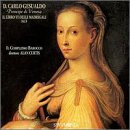| All Artists: Gesualdo Title: Prencipe Di Venosa: Complese Barroco Members Wishing: 1 Total Copies: 0 Label: Symphonia Release Date: 2/20/1996 Genres: Pop, Classical Styles: Vocal Pop, Symphonies Number of Discs: 1 SwapaCD Credits: 1 UPCs: 723722332623, 789368744725 |
Search - Gesualdo :: Prencipe Di Venosa: Complese Barroco
 | Gesualdo Prencipe Di Venosa: Complese Barroco Genres: Pop, Classical
|
Larger Image |
CD Details |
CD ReviewsA pleasant surprise a customer | US | 05/08/2009 (5 out of 5 stars) "When I ordered this album, I didn't know what to expect. Of the few recordings of Carlo Gesualdo's 5th and 6th books of madrigals available, I only knew of two truly stellar examples - those by the Consort of Musicke and Concerto Italiano. From what I can gather, those are tough groups to be measured up against.
Alan Curtis's vocal consort had been featured in Werner Herzog's eccentric (and often hilarious) documentary, "Gesualdo: Death for Five Voices." A few clips exist on YouTube, and I can't exactly call them flattering. They show a collection of overly expressive singers swaying to Gesualdo's chromatic creations - the melodrama is overpowering, while the intonation is lacking. Truth be told, I wasn't expecting a brilliant performance when I purchased Il Complesso Barocco's recording of Book VI - this is the toughest, most inventive repertoire composed by the "mad prince," and only a particular blend of highly skilled singers could possibly nail it. And what a surprise I was in for! This is a fantastic album. Maybe the performers were swaying in the studio, maybe not - but who really cares, after all? This is, by all standards, a superlative interpretation. It does not sound affected; the voices are balanced, clear, and use little to no vibrato. Independent lines in the more polyphonic passages stand out, while the dizzying chromaticism of Gesualdo's tortured chromatic inventions are rendered with extraordinary clarity - clarity that is, indeed, unusual for this repertoire. The performers are backed by light instrumental accompaniment, a feature that Alan Curtis is careful to justify as historically sound in his detailed liner notes. Several tracks are in fact performed entirely by instruments, a practice that was apparently in vogue during the late seventeenth century - but don't worry, the most famous (infamous?) of Gesualdo's pieces are left for the singers to tackle. This was apparently a landmark recording of Gesualdo's madrigals, the first to treat his works less as musical monstrosities and more as delicate works of extreme beauty. Gesualdo was certainly a musical oddball in just about every possible respect; as a wealthy Prince who devoted his life to composition, he was free to write in whatever manner he pleased - and he chose to fuse the developing expressivity of Claudio Monteverdi's "Seconda Prattica" with the traditional polyphonic idiom. The resulting hybrid could be described as Palestrina on crack. Okay, maybe that's a bit of an extreme generalization; but it was, at any rate, extraordinary and unique. Gesualdo sought to master his medium, and one could argue that he accomplished this goal fabulously. Alan Curtis's approach highlights the inherent musicality of these pieces; they were quite far from "atonal" or, for that matter, "ahead of their time." Gesualdo was, in fact, behind his time; he never quite embraced the emerging style of expressive monody pioneered by his far more well-known contemporary, Monteverdi. This album stands, first and foremost, as testament to the Prince's depth of musical talent, but it also ought to raise intriguing questions. Was his style influenced by his madness, his manic tendencies? Were his pained, chromatic passages in fact an expression of incorrigible guilt? Or are such interpretations outlandish - were his erratic, mannered compositions merely a reflection of the style of his age? Speculations aside, this is magnificent music, and I'm quite content with this interpretation. Note: Tower Records carries this album for around 20 bucks, although it takes several weeks to ship. My advice: buy it anyway, and endure the wait. This is the only recording I know of that covers the entire Book VI - and what's more, it's a definite keeper. Postscript: After several listens, I feel I should point out some problems with this recording. In more than a few instances, the vibrato throws the chords into disarray. I suppose this is a consequence of dramatic affect, which is certainly welcome in a Gesualdo madrigal, but I prefer the "purer" approach of Concerto Italiano and La Venexiana, particularly when it comes to pieces as chromatic as those of Book VI. Furthermore, there are a few pitch problems (although this could be a result of the experimental microtuning supposedly practiced by this ensemble, and my ears may not be accustomed), the sopranos are occassionally shrill on the higher notes, and certain intricate passages sound rushed and muddied, particularly in the famous "Moro, lasso". However, I still believe that this is an excellent disc. The singers perform Gesualdo's acrobatic compositions with extraordinary ease and comfort, and have a natural inclination for expressiveness that lends quite a dramatic edge to these madrigals - as the reviewer Giordano Bruno would say, they're "more Tasso than Petrarch" (Torquato Tasso being a neurotic but brilliant Italian poet who probably knew Gesualdo personally)." |

 Track Listings (23) - Disc #1
Track Listings (23) - Disc #1